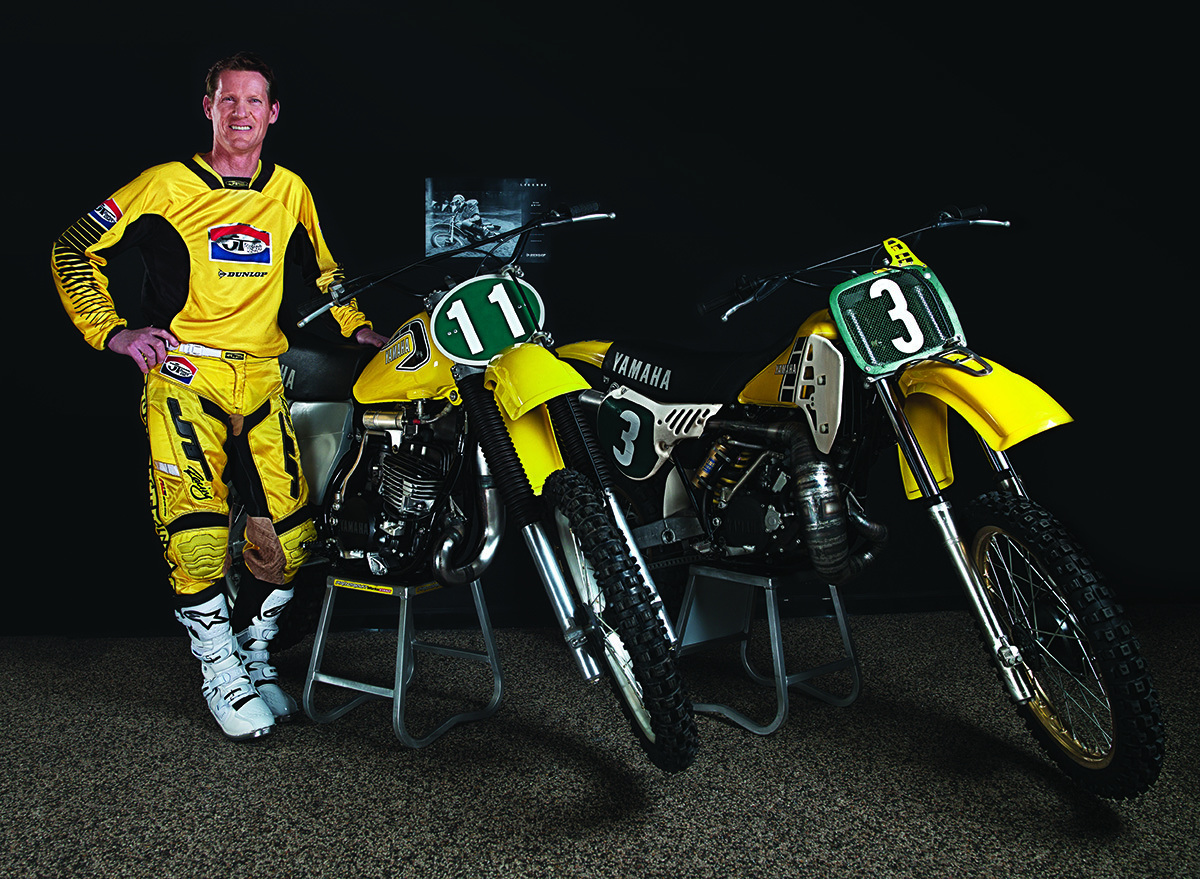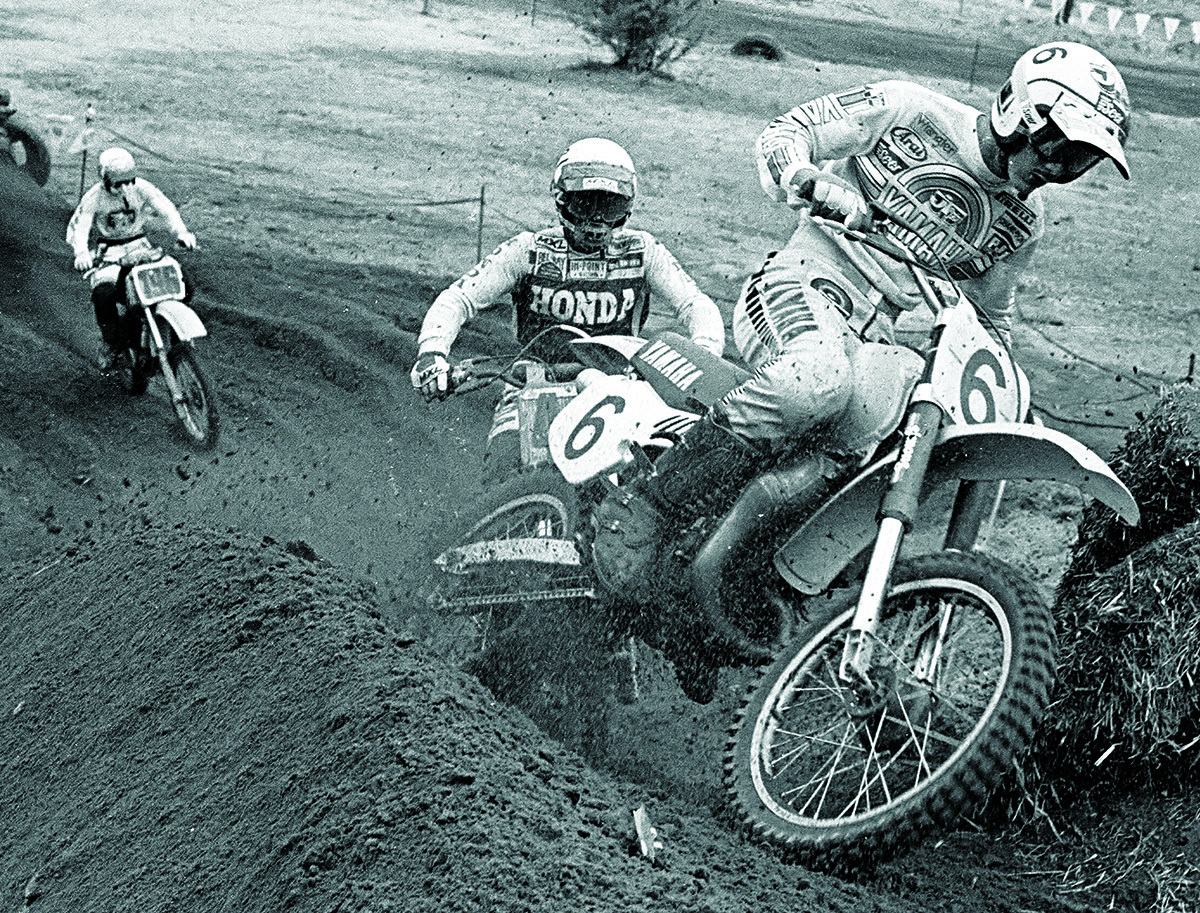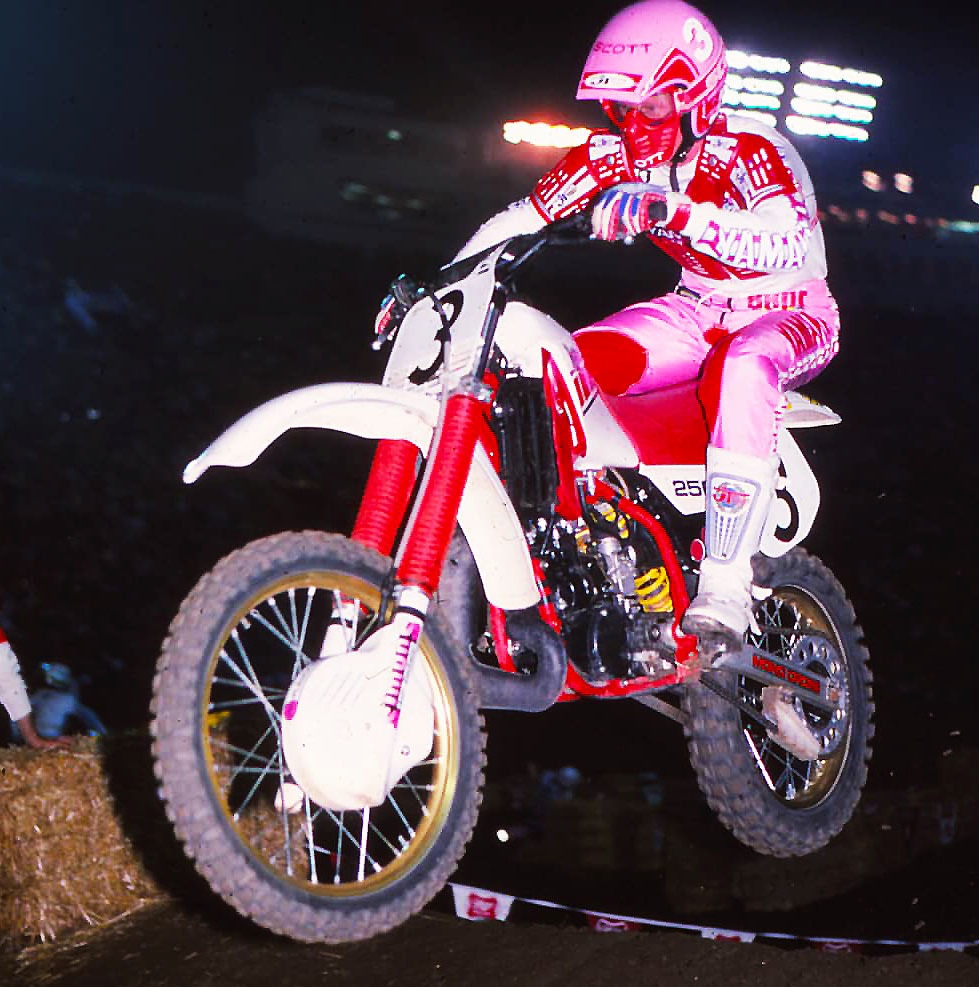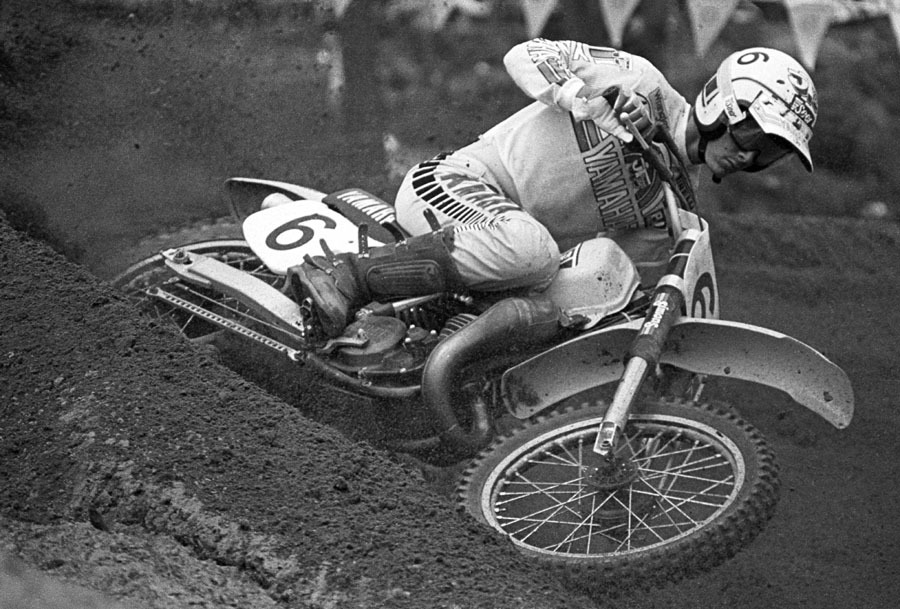Broc Glover interview - Golden Boy
Posted on October 16, 2023
Ask any AMA rider from the 1970’s or 80’s and they will talk about the Grand Prix series and Motocross of Nations with huge respect. Growing up riders like Broc Glover used to sit on the fence at circuits like Saddleback and enjoy watching names like Roger De Coster, Joel Robert and Torsten Hallman show the American racers what Motocross was all about. It was an era when Motocross in America was growing, and the Europeans made the most of the inexperienced Americans.
It’s no surprise that Glover grew up to be one of the greatest racers the sport has ever seen and it’s even less of a surprise that he’s still involved in the sport that made him famous. One element that differentiated Glover from his foes was his incredibly smooth riding style.
He was an all-business rider, refraining from flashy displays, always exhibiting absolute control in picture perfect form. The man was never out of shape on a bike, seemed to never put a foot wrong. Glover was the quintessential Californian.
His nickname, "Golden Boy," applied to his curly blonde hair as much as it did his remarkably impressive results. Raised on the tough CMC circuit of Southern California of the late 70s, which included the legendary venues of Carlsbad Raceway and Saddleback Park, the teenage Glover quickly established himself as a gifted local motocross pro.
We caught up with Glover at the Monster Energy FIM Motocross of Nations a a decade ago and asked him about his battles with the best Grand Prix riders in the World.

MXlarge: Broc, can you tell me about your first experience in the Grand Prix’s?
Glover: The first Grand Prix I ever rode was I think in 1978, it was the 125cc USGP at Mid-Ohio and I actually won it, so it was a good experience. I think I won both motos and it was fun because all the European riders I had read about in the magazine were racing, like Gaston Rahier and Harry Everts and riders like that. MXI: Did you go into that GP as a favourite to win it? Glover: I was the defending AMA 125cc Champion and leading the 125cc Championship that year, so I came into the event with a lot of confidence, I think I was favourite over the Euro’s, but I mean it’s a good question, 1978 and 79 was the Hannah era and Team USA did go to the Motocross des Nations in that era, but we were third or fourth or something. I wouldn’t consider us the top of the World yet, but I knew I was a pretty damn good 125cc rider and I felt comfortable enough that we were on American soil and I figured I could beat just about anyone back then. I didn’t win the race easily, but I had comfortable leads in the races.
MXI: After that first win how was your second appearance in the USGP?
Glover: The next year I rode another 125cc Grand Prix and I can’t really remember that clearly, I think Mark Barnett won it and we split motos or something. Then we had the mud race in 1980 that O’Mara won and those were my first three Grand Prix, and all were special experiences.
MXI: Of course, the biggest race of the calendar for US riders was the USGP at Carlsbad. You got to win that race in 1984, but what were your experiences with racing this race?
Glover: In 1984 I rode the 500cc USGP in Carlsbad. I fell in the first moto and got second and then won the second moto. I was also fastest qualifier and I thought I won the GP, but it was taken in times and I was pretty disappointed, Carlqvist got the win by two seconds and it was a mistake on my part and my team’s part. I thought by winning the second moto I had the overall, so the irony was the next year the television coverage, which was the Wide World of Sports told the organizers that they didn’t like how it took so long to work out the winner and they said if they were to cover the race live then they needed that changed, they needed to know the moment the winner crossed the finish line, because the whole thing about that show and the program their theme was the thrill of victory and the agony of defeat and they wanted to always have those emotions, stick the microphone in the winners face and then in the second placed finishes face to get the two emotions. They had to wait 30 to 40 minutes to do this with the old rule, so they said it didn’t work for them and the rules were changed. For the next four years it was run under the sanction of AMA rules that the overall was decided by the second moto.
MXI: As a Motocross fan I have watched all those videos on YouTube, but do you ever relive those great moment in the sports history?
Glover: You know what, I never watch those races on video, and I have never seen any of my USGP wins on video. No interest at all. I am proud what I did in my career, could I have done more, of course, could I have done less, for sure. I am proud, but it’s my past and now I am happy what I am doing. I mean I have challenges in my career now and also in my life, so I have moved forward. Motocross is still my past and future I hope so.
MXI: I am guessing you are around my age, and to be honest I feel like the older I get the better it feels. How is that for you?
Glover: It would be exciting to be a top Motocross rider now, but it was also exciting back in my time. I am with you, as you go through the process of life you learn a lot. When you are 18 years old you think you know everything, then when you are 25 you look back and realize that you didn’t know everything and you say to yourself, man if I knew what I know now when I was 18. Then you get to 35 and it’s the same story. It’s hard to overrate the experience of life, my mean physically you can’t do it anymore. They say youth is wasted on the young.

MXI: Let Broc by, that is something that will live with us forever. Does that event haunt you at all? (Bob Hannah was asked to let Glover pass to secure enough points to finish equal on points with Danny Laporte to win the 1977 AMA 125cc title on a count back).
Glover: The fact you are still talking about it in 2011 and it happened in 1977 says something. I don’t think it haunted me, I mean to me I don’t want to say it was overrated, but it was blown up by a couple of journalists, and for them it was maybe not a defining moment in their careers, but sure helped their careers. I don’t want to say they milked it for everything they could, but they did. Had it happened in the sport before, sure, I watched it happen in my rookie year and I know Suzuki used to do it. I mean I saw Grossi pull over for Danny Laporte, I saw it happen before and I’ve seen it happen since and it will happen again. Any team that invested that amount of money in the sport you do what you can do race and it means if you are employed by somebody and they tell you to move over, sure, it’s going to happen and was it team tactics, sure it was. I mean I had a DNF in a seven-round series, had I not had that DNF then I probably would have won it anyway and we wouldn’t be talking about it.
MXI: How did that feel to be put under the microscope like that?
Glover: All I can say is I was a young 16 years old and for me to even be in the position to win a Championship was pretty amazing. If somebody had told me at the start of the season, I would have had the chance to win the Championship I would have said no chance of that. Nobody expected me to be in that position. I mean I went into that last round and won the first moto and was five points back on the leader going into that last moto and I was proud of what I did. Had I gotten a great start and not had to have a team-mate help me, of course that would have been great.
MXI: You were also saved by Yamaha and didn’t race Supercross for some time. Why was that?
Glover: I didn’t ride Supercross in 1980, but I bothered Yamaha enough that they finally let me ride it; they didn’t let me ride Supercross for the first four years of my contract. They had Bell and Hannah and they didn’t want me to get hurt. In America they told me we sell more 125cc YZs than anything else, so you are important for us on that, and because I won three consecutive 125cc Motocross Championships they didn’t want me to get hurt.
MXI: What was the highlight of your GP experiences?
Glover: Highlight, I mean the USGP in mid-Ohio was very exciting, because it was my first one, but Carlsbad was near my home, it was kind of a home track, but funnily enough Carlsbad was often a frustrating race. I mean I qualified well clear of the field by a couple of seconds a lap, for me I was clearly the fastest guy on the track. I mean that first year suffering a crash and coming back all the way to second and then winning easily the second moto, thinking I won the overall and not winning, then I didn’t even ride the USGP in the following year, but I came back in 1983 and had another stupid error and crashed and got up backwards on the track and in the US and FIM rules you had to ride my bike backwards to bump-start it, but I rode it backwards down to a flat area, then because of this AMA rule I was disqualified. I mean there was a big fight between the AMA and the FIM about the ruling, but the AMA won out and I was out.

MXI: I remember attending the 1984 USGP and while you were fast, you probably got a little lucky in that race. What is your opinion?
Glover: In 1984 I came back and I guess I finally won it, but I should have won it the first year, so I was always bothered by that. Then in 1985 I came back and rode really well and didn’t win it. In 1984 I wasn’t the fastest guy out there, Bailey was, and he should have won it, but he fell. Then in 85 I was faster, and I had won the 500cc National Championship in the outdoors and I should have won that USGP, but I didn’t win it again. To me it was way too much frustration, I mean I didn’t feel as snake bitten as Roger De Coster there (De Coster never won the USGP), but to me I should have won it two or three times in the four years I rode it, and I won it once and the year I won it I shouldn’t have won it.
MXI: What about that era when the American riders suddenly took over from the Grand Prix riders?
Glover: It was fantastic for us, I mean in 1981 and 1982 teams were the Honda teams, because previously in 1978 and 1979 the manufactures spent a lot of money sending the teams over, like the teams Hannah rode in, and they were third and fourth and fifth, but they never won the Motocross des Nations and they were not expected to win it. But then they decided to not race it and a few Belgian businesspeople talked to Roger De Coster and said we have to have an American team over here. America has to be considered at that time as one of the top five teams in the World and they had to be there. So anyway, Honda paid for the team in 1981 and they won.
MXI: Was that tough not being in the first teams to win the MXdN?
Glover: Had you picked a normal team I would have been selected, I mean as a kid growing up I always looked at the European riders, these were the guys who I looked up to and as a very young child I got to see these guys race at a local track around my home. When Motocross came to America Edison Dye who brought the European riders to America lived in the town next to mine. The Hallman riding gear distributor and the Husqvarna distributor were in my hometown, so I got to see Motocross in its infancy in the United States and I always looked up to those guys. Having seen Joel Robert, Arnie Kring, Torsten Hallman to see these guys riding in the late 60’s and early 70’s, it was mind blowing for a young Motocross fan. To me the GP’s was where it was, so coming to do the Motocross des Nations and some GP’s was super important for me.
MXI: Did you agree with the Honda teams going to the MXdN?
Glover: Because Honda won in 1981 and they put the money on the table their riders were selected again in 1982, so it was a reward and they never let anyone down. Sure, having beaten every guy on that team I was disappointed I wasn’t on those early teams. I got my chance in 1983 and we lived up to it and the first race I did at the MXdN I won the moto and I was on the winning team for two years. I would have been on more, but I had many injuries and didn’t get to ride more than those two. In 1985 I had a broken wrist; I was selected but couldn’t ride.
MXI: And then you finally get picked in 1983. How was that?
Glover: You know the year I went we had you could say the dream team. I mean they coined the dream team later on (1986), but I felt like that first team I was on, was a pretty good team. We had David Bailey and Mark Barnet and Jeff Ward, and we were all very strong, all on different bikes. We were competitive in America and also on different teams, but when we came to Europe, we hung out together for an entire week, we realty bonded. None of us liked to lose and when we got to Europe you hated to lose, and you had that extra burden of not wanting to let your team-mates down and you didn’t want to let your country down. There was no way for us to not win it. I mean the previous years it was like the B-Team, and they won it, so we had to win it, because we were the A-Team. All of a sudden Team USA wasn’t the underdogs and we felt like we couldn’t lose it.
MXI: 1984 in Sweden was also a special moment for you wasn’t it?
Glover: I filled in again in 1984 and I rode the Trophy des Nations in Sweden we were first, second, third and fourth across the finish line in the first moto, to be part of that, it’s was a huge honour.
MXI: What is it with the American riders? They always seemed to come through in a crunch.
Glover: You come over here and you have your race face on and I know in Italy in 2009 and it was another riders bad fortune that helped Team USA win that year, but then again you have guys like James Stewart who still isn’t coming over to race it and the team they had in 2011 in France was a pretty good team, but Baggett had some issues. Baggett rode well on the Saturday, but he had issues with his starts. I mean it’s the same thing that was for us in the 1980’s, you don’t want to let your team-mates down or your country; it’s a pretty simple formula for success.

Broc Glover – The Story
In 1977, Glover, a 17-year old rookie, won the AMA 125cc Motocross Championship for Yamaha. The victory was somewhat marred by the famous incident at the final round when teammate Bob Hannah was ordered to move over and allow Broc by to secure the title.
To quiet any sceptics about his right to the 125cc throne, Glover proceeded to win the title again in 1978, and again in 1979, becoming the series' first three-time champion. In 1978, in addition to nabbing the 125cc championship, Glover won the prestigious 125cc USGP motocross race.
In 1981, still aboard a Yamaha, Broc Glover move to the 500cc class, proving his versatility by winning six of the eight rounds to garner the championship. That same year he won the Trans-USA (formerly the Trans-AMA), once again dominating by winning four of the five rounds.
Glover took home a second 500cc Championship in 1983 and followed that up by being named to Team USA to compete in the Trophee des Nations. The team, comprised of David Bailey, Mark Barnett, Jeff Ward, and Broc Glover, went on to dominate the event. Glover returned on the 1984 team to once again help secure America's dominance.
1985 gave Glover his third 500cc Motocross Championship, bringing his total championships to six (a record that stood until Ricky Carmichael broke it in 2003). Although all six of his titles were for outdoor series, Glover was an exceptional Supercross rider, tallying 10 wins over his career.
A wrist injury and later a broken leg took its toll on Glover and the Golden Boy decided to retire in 1988. After an entire career riding for Yamaha, Glover-whose appetite for true European motocross had been whetted by his two outings in the Trophee des Nations-accepted an offer to ride for KTM on the GPs.
This was not anything like the present incarnation of the Austrian brand, and Glover suffered a number of mechanicals that prevented him from shining. He did manage one moto win in the championship.
Two distinct memories I have of Broc were two appearances he made at the Carlsbad USGP. I'm not talking about his results; a win in 1984 and a tie that demoted him to second, based on aggregate time in 1983.
I'm talking about the brash statement he made in riding gear. I can't recall which year was which, but Glover went out on track in all-white JT gear. It was to reflect the hot California sun and keep him cool. This was an industry first and spawned a rash of sales.
The next gear choice (again, I forget what year) was pink. Those of us that were there couldn't believe it at first. Glover had donned the aesthetic antithesis of motocross and pulled it off beautifully. Again, the move spawned a rash of pink riding gear at local MX tracks everywhere.
All in all, Broc Glover, the stalwart Yamaha factory rider, earned an amazing 45 career AMA national motocross wins, as well as 5 victories in the Trans-AMA. Today Glover works for Dunlop and is a regular sight in the pits of both motocross and supercross races.
Paul Buckley images













